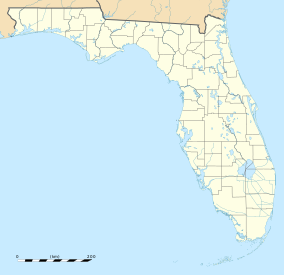Jonathan Dickinson State Park
| Jonathan Dickinson State Park | |
|---|---|
IUCN category V (protected landscape/seascape) | |
| Location | Martin County, Florida, United States |
| Nearest city | Hobe Sound / Tequesta, Florida |
| Coordinates | 27°00′22″N 80°07′44″W / 27.00611°N 80.12889°W |
| Area | 11,500 acres (47 km2) |
| Established | 1950 |
| Visitors | 172,000 (in 2004) |
| Governing body | Florida Department of Environmental Protection |

Jonathan Dickinson State Park is a Florida State Park and historic site in Martin County, Florida, between Hobe Sound and Tequesta. The park has many kinds of areas, such as sand pine scrub, pine flatwoods, mangroves, and river swamps. The Loxahatchee River, which was named a National Wild and Scenic River in 1985 (the first in Florida), runs through the park. The address is 16450 S.E. Federal Highway, Hobe Sound.
History
[change | change source]The park is named after Jonathan Dickinson, a Quaker merchant who was shipwrecked in 1696, with his family and others, on the Florida coast near the present-day park. He wrote a journal about their encounters with local tribes, and their journey up the coast to St. Augustine.
A man known as Trapper Nelson lived on the banks of the Loxahatchee River after coming to the area in the 1930s, living off the land trapping and selling furs. He soon became known as the Wildman of the Loxahatchee. After he died in 1968 the state got his land, and gave it to the park.
The United States Army established Camp Murphy, a top-secret radar training school, in the area that is now the park, in 1942. The camp included over 1,000 buildings, and housed more than 6,000 officers and soldiers. The camp stopped being used in 1944, after only two years. Most of the camp buildings were torn down, but some of the building foundations remain. The property was given to the State of Florida in 1947, and opened as a state park in 1950.
Recreational activities
[change | change source]The park has such activities as bicycling, boat tours, boating, cabins, canoeing, fishing, hiking, horse trails, kayaking, picnicking areas, swimming, wildlife viewing and full camping facilities. It also has the Elsa Kimbell Environmental Education and Research Center, with exhibits about the park's natural and cultural history. The park operates a 44-passenger boat for tours of Trapper Nelson's homestead.
Gallery
[change | change source]-
Yellow-crowned Night Heron on Kitching Creek
-
Ibis on the Loxahatchee
-
Pileated Woodpecker on Kitching Creek
-
Great Blue Heron on the Loxahatchee
Other websites
[change | change source]- Jonathan Dickinson State Park Archived 2005-12-21 at the Wayback Machine – official site
- Jonathan Dickinson State Park at State Parks of the United States
- Jonathan Dickinson State Park Archived 2011-04-21 at the Wayback Machine at Absolutely Florida





